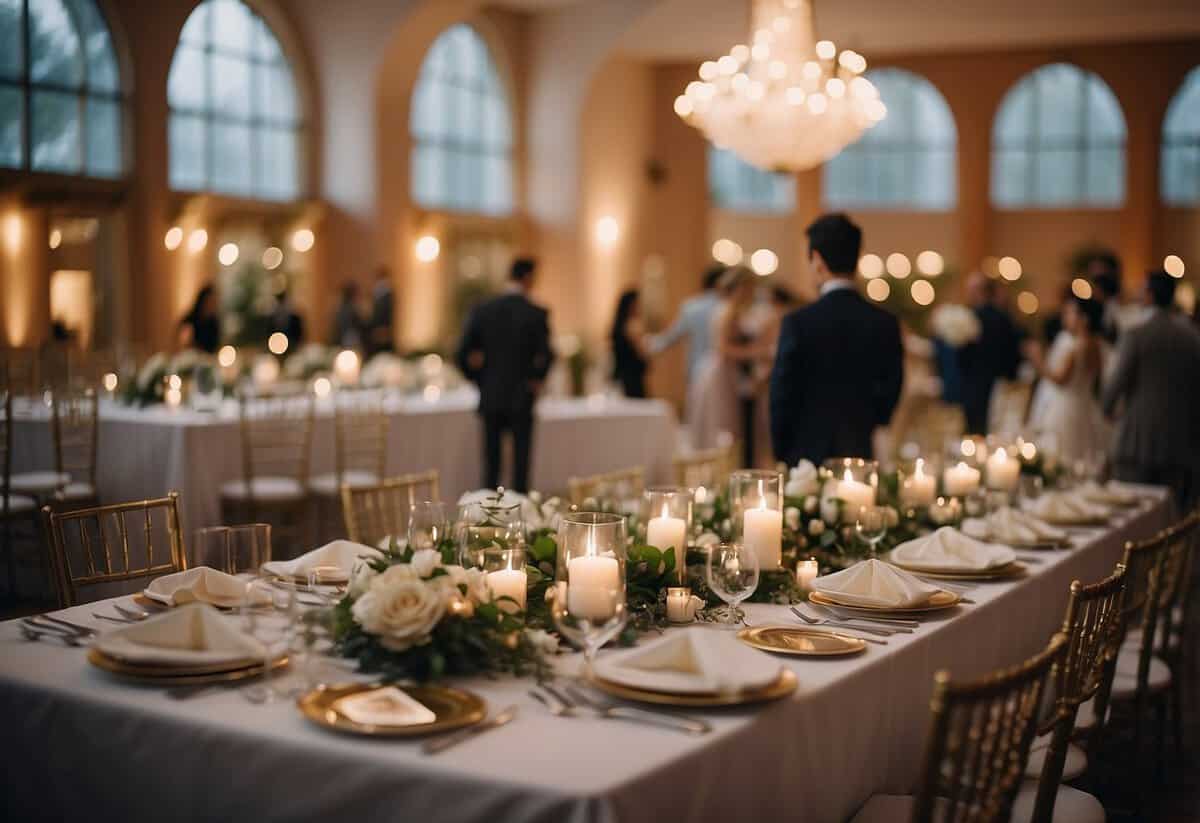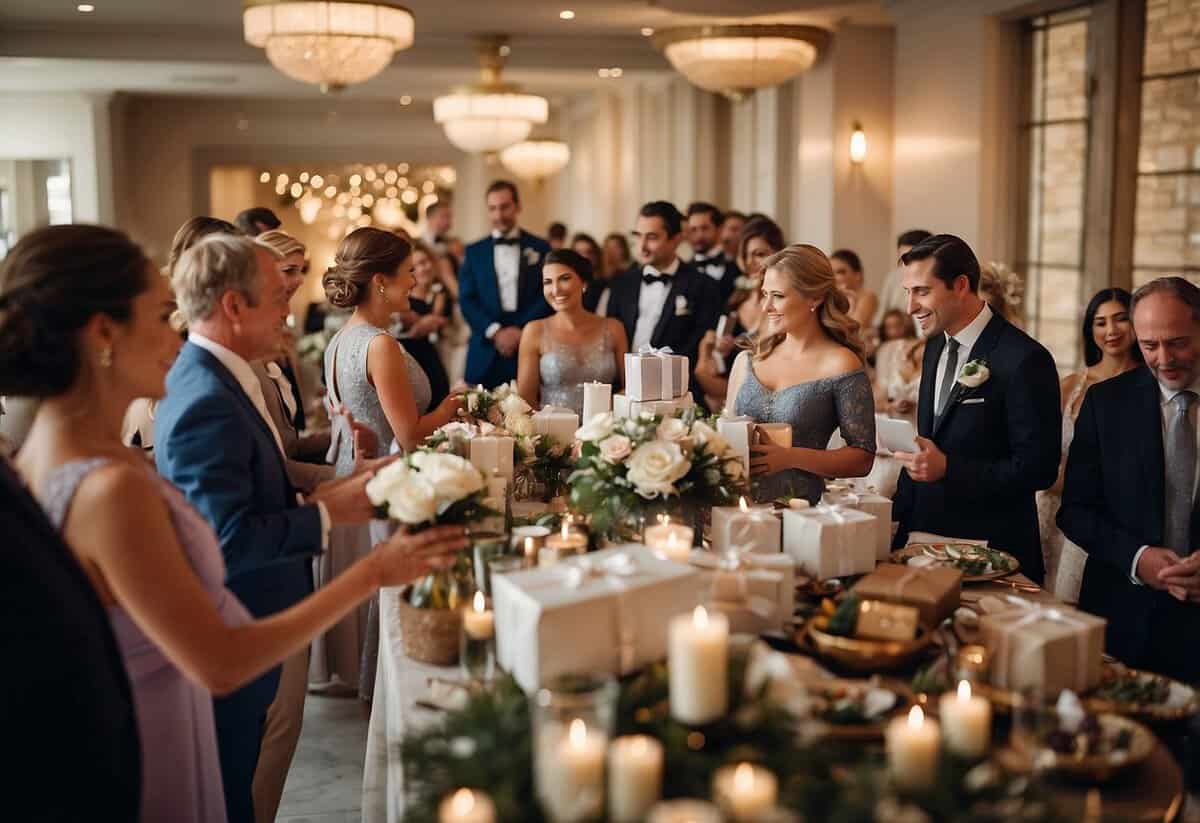What Percentage of Wedding Guests Don’t Give a Gift? Exploring the Numbers
Weddings are joyous celebrations filled with love, laughter, and cherished moments. As you plan your big day, you might wonder about the traditions and etiquette surrounding wedding gift-giving. An interesting fact to know is that not all guests bring gifts. Between 7 and 10 percent of wedding guests do not give a gift.

This statistic might come as a surprise, especially considering how ingrained the gift-giving tradition is in many cultures. There can be several reasons for this, including financial constraints or the costs associated with attending the wedding. For instance, attending a wedding might involve travel and accommodation expenses, which can be burdensome for some guests.
Remember, while gifts are a wonderful part of wedding celebrations, the presence of friends and family is what truly makes your day special. Knowing what to expect can help you prepare and focus on enjoying your wedding rather than worrying about the etiquette of gift-giving.
Understanding Wedding Gift Etiquette

Wedding gift etiquette involves understanding the importance of giving a gift and how traditions and relationships influence your choice. It’s about more than just the gift; it’s a gesture of love and support for the couple.
Importance of Giving a Wedding Gift
Giving a wedding gift is a way to show your appreciation for being invited. It’s a gesture that helps commemorate the couple’s special day.
Gifts can range from a thoughtful item to a monetary contribution. Many guests believe the amount you spend should reflect your budget and relationship with the couple. For example, gifts typically fall between $50 and $150 depending on how close you are to the couple.
A group gift is also an acceptable and often encouraged option. This allows you to contribute to a larger, more significant present without straining your finances.
The Role of Tradition and Relationship
Tradition plays a significant role in wedding gift-giving. Historically, it has been customary to give a gift to honor the couple and support their new life together. This tradition continues strong today.
Your relationship with the couple greatly influences your gift choice. For instance, distant relatives or coworkers might give gifts in the $50-$75 range, while closer friends and family might aim for gifts between $100 and $150.
Considering the personal bond you share, along with your budget, is crucial in deciding what to give. You don’t have to break the bank; what matters most is the thought and care behind your gift.
Factors Affecting Gift Giving

Wedding gift-giving can be influenced by many things, from financial constraints to personal and cultural differences. Let’s explore these factors in detail.
Financial Constraints and Budgeting
Many guests may face financial constraints that make it difficult to afford a wedding gift. Weddings often come with other expenses such as travel, attire, and accommodation. These added costs can strain a guest’s budget, leading them to skip the gift.
Moreover, some people might also have their own budgeting priorities. For example, young guests who are still in school or just starting their careers might not have extra money for gifts.
In some cases, those who attend multiple weddings in a short time might find it financially tough to buy gifts for each event. In these situations, it’s easy to understand why someone might forego a wedding gift.
Personal Circumstances
Personal circumstances can also play a significant role. Life events such as job loss, medical issues, or other emergencies can impact a guest’s ability to give a gift.
For instance, if a guest is dealing with a sudden expense or financial setback, buying a wedding gift might not be possible. Additionally, some guests might prioritize supporting the couple in non-material ways, such as offering their time or help with the wedding.
It’s also possible that someone might forget or overlook the gift due to busy schedules or personal distractions, not out of malice but simply because they have too much on their plate.
Cultural and Regional Differences
Cultural and regional differences greatly affect gift-giving practices. In some cultures, it’s common for guests to give money instead of physical gifts, while in others, gifts might not be expected at all.
For example, in some European countries, wedding gifts are not as emphasized as in the United States. In certain Asian cultures, giving money in red envelopes is the norm.
Personal beliefs and traditions from their culture might guide guests’ decisions on whether or not to bring a gift. Additionally, regional norms and practices can vary greatly, even within the same country.
Understanding these differences can help couples be more considerate about why some guests might choose not to give a gift.
What to Do When Guests Don’t Give a Gift

When wedding guests don’t give a gift, it’s important to handle the situation with grace and thoughtfulness. Address the issue with kindness to maintain positive relationships and demonstrate gratitude.
Addressing Non-Gift Giving
If a guest doesn’t bring a gift, you should still recognize their presence at your wedding. Sending a thank you card is a classy move. In the card, express your gratitude for their attendance and support on your special day. This gesture is simple and shows appreciation without making them feel uncomfortable.
Sometimes guests need a gentle reminder. You can mention you are finalizing your wedding list and thank them again for their participation. This might encourage them to give a gift if it was an oversight.
Steps to Address Non-Gift Giving:
- Send a thank you note.
- Mention gratitude for their presence.
- Offer a polite reminder if needed.
Using these steps creates a positive experience for both you and your guest.
Maintaining Relationships and Gratitude
Keeping relationships strong is essential, even when a guest doesn’t give a gift. Focus on the positive aspects of their attendance and the happiness they brought to your wedding. Consider what is more important – the relationship or the gift.
By showing gratitude, you can maintain and even enhance your relationship. Thank them sincerely for being part of your celebration. This demonstrates that you value their friendship more than material items.
You should remind yourself and communicate that the presence of loved ones is a priceless gift. This approach fosters a spirit of appreciation and keeps your relationships intact.
Two key practices:
- Be grateful for their attendance.
- Maintain open and positive communication.
The Significance of Different Types of Gifts

When it comes to wedding gifts, the type of gift can reflect personal style, practicality, and financial considerations. Let’s explore the significance of different gift types to better understand their impact.
Cash Versus Physical Gifts
Cash gifts offer flexibility to the newlyweds, allowing them to use the money for their immediate needs or save for future plans. Cash is often seen as a practical and thoughtful choice, especially if the couple is saving for a big purchase like a home.
Physical gifts, on the other hand, tend to be more personal. These can include household items, kitchen gadgets, or decorative pieces. Physical gifts are often chosen to reflect the couple’s tastes or needs. Many guests appreciate the tangible aspect of physical gifts, as they can be wrapped and presented with a flourish. A well-thought-out physical gift can also become a cherished keepsake for the couple.
Group Gifts and Registries
Group gifts are a great way to contribute to a more expensive item that the couple has their eyes on. Coordinating with other guests to purchase a significant item, such as a high-quality refrigerator or a luxury bed set, can be both practical and memorable. Group gifts are often facilitated through wedding registries, which list items the couple has specifically chosen.
Wedding registries simplify the gift-giving process. They ensure that the couple receives items they need and want, reducing the likelihood of duplicates or unwanted presents. Registries can include a mix of both small and big-ticket items, catering to various budgets. They can also feature both physical gifts and options for cash contributions, offering flexibility for all guests.
Using a registry takes the guesswork out of gift-giving, letting you select something that the couple truly desires.
Navigating Wedding Gift Challenges

Wedding gift challenges can arise from cultural differences, personal circumstances, or simple oversight. Handling these situations with grace and understanding is key to maintaining relationships and enjoying your special day.
Handling Sensitive Gift Situations
Sometimes, guests don’t bring gifts due to various reasons, such as cultural practices or personal financial struggles. It’s essential to approach these situations with empathy.
If a guest didn’t bring a gift, consider sending a thank-you note for their presence. This can be a subtle reminder that their attendance was valued, and might prompt them to send a gift later.
Avoid making assumptions. There could be an honest oversight. People might have thought they sent the gift but forgot. In such cases, keeping an open and understanding mindset can prevent unnecessary hurt feelings.
Keep the focus on the thoughtful gifts you did receive. Appreciate what was given rather than dwelling on what wasn’t.
When to Let It Go
At times, it’s best to simply let it go. Pursuing the matter further can come off as petty and might strain relationships. Understanding that not everyone follows the same gift-giving rules is crucial.
If a close friend or family member didn’t give a gift, consider their circumstances. They might be facing financial difficulties or other personal issues. Recognizing that everyone’s situation is different will help you relax and enjoy your wedding memories.
Focus on the joy of your special day. Gifts are a lovely bonus, but the main event is celebrating love and commitment. Keep this in mind when navigating these delicate situations.


